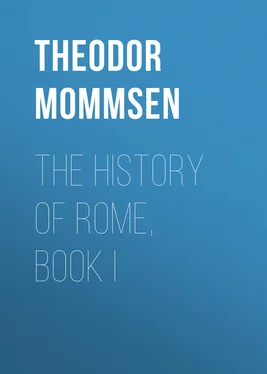Theodor Mommsen - The History of Rome, Book I
Здесь есть возможность читать онлайн «Theodor Mommsen - The History of Rome, Book I» — ознакомительный отрывок электронной книги совершенно бесплатно, а после прочтения отрывка купить полную версию. В некоторых случаях можно слушать аудио, скачать через торрент в формате fb2 и присутствует краткое содержание. Жанр: foreign_prose, История, foreign_edu, foreign_antique, на английском языке. Описание произведения, (предисловие) а так же отзывы посетителей доступны на портале библиотеки ЛибКат.
- Название:The History of Rome, Book I
- Автор:
- Жанр:
- Год:неизвестен
- ISBN:нет данных
- Рейтинг книги:5 / 5. Голосов: 1
-
Избранное:Добавить в избранное
- Отзывы:
-
Ваша оценка:
- 100
- 1
- 2
- 3
- 4
- 5
The History of Rome, Book I: краткое содержание, описание и аннотация
Предлагаем к чтению аннотацию, описание, краткое содержание или предисловие (зависит от того, что написал сам автор книги «The History of Rome, Book I»). Если вы не нашли необходимую информацию о книге — напишите в комментариях, мы постараемся отыскать её.
The History of Rome, Book I — читать онлайн ознакомительный отрывок
Ниже представлен текст книги, разбитый по страницам. Система сохранения места последней прочитанной страницы, позволяет с удобством читать онлайн бесплатно книгу «The History of Rome, Book I», без необходимости каждый раз заново искать на чём Вы остановились. Поставьте закладку, и сможете в любой момент перейти на страницу, на которой закончили чтение.
Интервал:
Закладка:
The King
As the clans resting upon a family basis were the constituent elements of the state, so the form of the body-politic was modelled after the family both generally and in detail. The household was provided by nature herself with a head in the person of the father with whom it originated, and with whom it perished. But in the community of the people, which was designed to be imperishable, there was no natural master; not at least in that of Rome, which was composed of free and equal husbandmen and could not boast of a nobility by the grace of God. Accordingly one from its own ranks became its "leader" (-rex-) and lord in the household of the Roman community; as indeed at a later period there were to be found in or near to his dwelling the always blazing hearth and the well-barred store-chamber of the community, the Roman Vestas and the Roman Penates—indications of the visible unity of that supreme household which included all Rome. The regal office began at once and by right, when the position had become vacant and the successor had been designated; but the community did not owe full obedience to the king until he had convoked the assembly of freemen capable of bearing arms and had formally challenged its allegiance. Then he possessed in its entireness that power over the community which belonged to the house-father in his household; and, like him, he ruled for life. He held intercourse with the gods of the community, whom he consulted and appeased (-auspicia publica-), and he nominated all the priests and priestesses. The agreements which he concluded in name of the community with foreigners were binding upon the whole people; although in other instances no member of the community was bound by an agreement with a non-member. His "command" (-imperium-) was all-powerful in peace and in war, on which account "messengers" (-lictores-, from -licere-, to summon) preceded him with axes and rods on all occasions when he appeared officially. He alone had the right of publicly addressing the burgesses, and it was he who kept the keys of the public treasury. He had the same right as a father had to exercise discipline and jurisdiction. He inflicted penalties for breaches of order, and, in particular, flogging for military offences. He sat in judgment in all private and in all criminal processes, and decided absolutely regarding life and death as well as regarding freedom; he might hand over one burgess to fill the place of a slave to another; he might even order a burgess to be sold into actual slavery or, in other words, into banishment. When he had pronounced sentence of death, he was entitled, but not obliged, to allow an appeal to the people for pardon. He called out the people for service in war and commanded the army; but with these high functions he was no less bound, when an alarm of fire was raised, to appear in person at the scene of the burning.
Конец ознакомительного фрагмента.
Текст предоставлен ООО «ЛитРес».
Прочитайте эту книгу целиком, купив полную легальную версию на ЛитРес.
Безопасно оплатить книгу можно банковской картой Visa, MasterCard, Maestro, со счета мобильного телефона, с платежного терминала, в салоне МТС или Связной, через PayPal, WebMoney, Яндекс.Деньги, QIWI Кошелек, бонусными картами или другим удобным Вам способом.
1
It has, I believe, been largely in use at Oxford for the last thirty years; but it has not apparently had the good fortune to have come to the knowledge of the writer of an article on "Roman History" published in the Encyclopedia Britannica in 1886, which at least makes no mention of its existence, or yet of Mr. Baring-Gould, who in his Tragedy of the Caesars (vol. 1. p. 104f.) has presented Dr. Mommsen's well-known "character" of Caesar in an independent version. His rendering is often more spirited than accurate. While in several cases important words, clauses, or even sentences, are omitted, in others the meaning is loosely or imperfectly conveyed—e.g. in "Hellenistic" for "Hellenic"; "success" for "plenitude of power"; "attempts" or "operations" for "achievements"; "prompt to recover" for "ready to strike"; "swashbuckler" for "brilliant"; "many" for "unyielding"; "accessible to all" for "complaisant towards every one"; "smallest fibre" for "Inmost core"; "ideas" for "ideals"; "unstained with blood" for "as bloodless as possible"; "described" for "apprehended"; "purity" for "clearness"; "smug" for "plain" (or homely); "avoid" for "avert"; "taking his dark course" for "stealing towards his aim by paths of darkness"; "rose" for "transformed himself"; "checked everything like a praetorian domination" for "allowed no hierarchy of marshals or government of praetorians to come into existence"; and in one case the meaning is exactly reversed, when "never sought to soothe, where he could not cure, intractable evils" stands for "never disdained at least to mitigate by palliatives evils that were incurable."
2
I have deemed it, in general, sufficient to give the value of the Roman money approximately in round numbers, assuming for that purpose 100 sesterces as equivalent to 1 pound sterling.—TR.
3
The dates as hereafter inserted in the text are years of the City (A.U.C.); those in the margin give the corresponding years B.C.
4
Some of the epitaphs may give us an idea of its sound; as -theotoras artahiaihi bennarrihino- and -dasiihonas platorrihi bollihi-.
5
The hypothesis has been put forward of an affinity between the Iapygian language and the modern Albanian; based, however, on points of linguistic comparison that are but little satisfactory in any case, and least of all where a fact of such importance is involved. Should this relationship be confirmed, and should the Albanians on the other hand—a race also Indo-Germanic and on a par with the Hellenic and Italian races—be really a remnant of that Hellene-barbaric nationality traces of which occur throughout all Greece and especially in the northern provinces, the nation that preceded the Hellenes would be demonstrated as identical with that which preceded the Italians. Still the inference would not immediately follow that the Iapygian immigration to Italy had taken place across the Adriatic Sea.
6
Barley, wheat, and spelt were found growing together in a wild state on the right bank of the Euphrates, north-west from Anah (Alph. de Candolle, Geographie botanique raisonnee, ii. p. 934). The growth of barley and wheat in a wild state in Mesopotamia had already been mentioned by the Babylonian historian Berosus (ap. Georg. Syncell. p. 50 Bonn.).
7
Scotch -quern-. Mr. Robertson.
8
If the Latin -vieo-, -vimen-, belong to the same root as our weave (German -weben-) and kindred words, the word must still, when the Greeks and Italians separated, have had the general meaning "to plait," and it cannot have been until a later period, and probably in different regions independently of each other, that it assumed that of "weaving." The cultivation of flax, old as it is, does not reach back to this period, for the Indians, though well acquainted with the flax-plant, up to the present day use it only for the preparation of linseed-oil. Hemp probably became known to the Italians at a still later period than flax; at least -cannabis- looks quite like a borrowed word of later date.
Читать дальшеИнтервал:
Закладка:
Похожие книги на «The History of Rome, Book I»
Представляем Вашему вниманию похожие книги на «The History of Rome, Book I» списком для выбора. Мы отобрали схожую по названию и смыслу литературу в надежде предоставить читателям больше вариантов отыскать новые, интересные, ещё непрочитанные произведения.
Обсуждение, отзывы о книге «The History of Rome, Book I» и просто собственные мнения читателей. Оставьте ваши комментарии, напишите, что Вы думаете о произведении, его смысле или главных героях. Укажите что конкретно понравилось, а что нет, и почему Вы так считаете.











